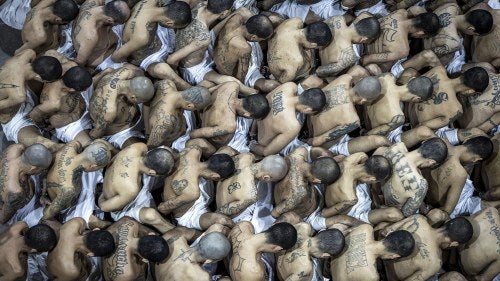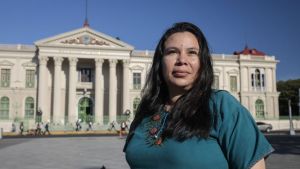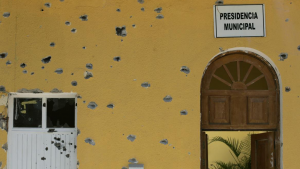El Salvador's Crackdown on Gangs, Explained

Mass arrests have reduced crime in the short-term—but at a significant cost to human rights.
Last year, 92 people were killed in one of El Salvador's deadliest spikes of gang violence in recent history. In response, President Nayib Bukele’s government declared a national state of emergency, passed sweeping laws that suspended certain rights and arrested alleged gang members en masse. Since then, the government reports it has detained at least 65,000 alleged gang members.
These changes are widely supported at home. Across the country, communities who lived under gang control for decades report significant changes on the ground. For the first time in years, business owners and residents are no longer forced to pay monthly extortion fees, and many feel safer in public spaces.
However, Bukele’s crackdown on gangs comes at an incalculable price for democracy, human rights, and long-term stability. Reports from Human Rights Watch and Amnesty International document widespread abuse and accuse the government of arbitrary detention, indiscriminate arrests, torture against detainees, deaths in custody, extrajudicial killings, abuse-ridden prosecutions, and enforced disappearances.
Many of the alleged “terrorist” arrests appear to lack sufficient reasoning to suspect gang involvement. Grounds for detention include having tattoos, living in low-income neighborhoods, and appearing nervous. Multiple cases documented by Human Rights Watch and Cristosal indicate mass detention of innocent men, women, and children. Among the policy changes enacted under Bukele’s mano duro strategy (which translates to “iron fist”) is a law that lowers the age of criminal responsibility for children from 16 to 12 years old. As of September, more than 1,600 children were detained.
Furthermore, the legislature now allows for indefinite pretrial detention. As reported in October, none of those detained under the state of emergency had been taken to trial after as many as seven months. Not only does this prevent the release of wrongly detained individuals, but it also prevents victims and their families from seeking justice for violent crimes, since both real perpetrators and innocent bystanders are held indefinitely under the broad accusation of belonging to a “terrorist organization.” Zaira Navas, former inspector general of El Salvador’s police force, asserts that the arrests have only reached 30 percent of gang members. The rest, she claims, are mostly civilians.
Government Corruption
Earlier this year, Bukele tweeted dramatic footage of a new mega-prison that is projected to house 40,000 inmates, making it the most overcrowded prison in the world. “Criminals,” he said, are less scary without protection from “the corrupt politicians and international organizations that finance and defend them.”
In reality, his government relies heavily on support from the gangs. This tweet came just one day after the US Justice Department accused his government of secretly negotiating with MS-13 gang leaders. Experts argue that the timing is no coincidence but rather an effort to distract from allegations of collusion and promote an “iron fist” narrative.
Bukele’s government has reported a declining murder rate for years; however, that decline is partly the result of government collusion with MS-13 leaders, who were provided financial incentives to help fudge the numbers, according to a 2020 US indictment.
Along with economic benefits, top Salvadoran officials promised lighter sentences for some leaders, protection from US extradition requests, and special privileges in the prisons, including access to mobile phones and sex workers. In exchange, gangs agreed to support Bukele’s party in the upcoming elections and bury or otherwise hide bodies to reduce the number of recorded murders.
Support for Bukele Remains Strong
Nevertheless, Bukele remains popular both at home and abroad. Public approval for his leadership has hovered around 80 percent in recent months. Polling also suggests that only 1.3 percent of Salvadorans view corruption as the country’s primary problem.
El Salvador’s tactics have also generated praise, pro-Bukele parades, and calls for similar policies in neighboring countries such as Guatemala, Honduras, Costa Rica, Colombia, Peru, and Chile. The viral images of detainees in the mega-prison prompted some in the United States to argue in favor of “an American Bukele.”
Addressing Root Causes
Even as Bukele’s harsh tactics seem to be having some short-term success, the use of harsh collective punishment risks creating even more criminal elements. US prisons were once a breeding ground for MS-13 in its early years. Today overcrowded prisons may serve as an effective networking environment for gangs and will provide them with 24/7 access to recruit at-risk youth.
Economic disparity and ineffective governance are driving forces of gang membership. Policing can only go so far if there is little effort to address citizen grievances, which leaves so many in El Salvador’s population with few economic alternatives. In order to establish any sort of sustainable peace and long-term stability, Salvadoran leadership must prioritize strategies that increase opportunities for young people.


Related Content
 Migration
Migration
Gus Hart Visiting Fellow Rosa Anaya joins Deep Dish to discuss her work rehabilitating inmates and gang members in El Salvador with Catholic Relief Services’ Second Changes.
 Migration
Migration
Millions have fled El Salvador, Guatemala and Honduras, and it’s not surprising, 43 of the 50 most homicidal cities are located in Latin America and the Caribbean.

